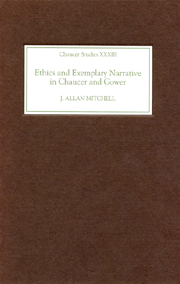Book contents
- Frontmatter
- Contents
- Acknowledgements
- Abbreviations
- Introduction
- 1 Reading for the Moral: Controversies and Trajectories
- 2 Rhetorical Reason: Cases, Conscience, and Circumstances
- 3 Gower For Example: Confessio Amantis and the Measure of the Case
- 4 All That Is Written For Our Doctrine: Proof, Remembrance, Conscience
- 5 Moral Chaucer: Ethics of Exemplarity in the Canterbury Tales
- 6 Pointing the Moral: The Friar, Summoner, and Pardoner's Satire
- 7 Griselda and the Question of Ethical Monstrosity
- Conclusion
- Bibliography
- Index
- CHAUCER STUDIES
7 - Griselda and the Question of Ethical Monstrosity
Published online by Cambridge University Press: 12 September 2012
- Frontmatter
- Contents
- Acknowledgements
- Abbreviations
- Introduction
- 1 Reading for the Moral: Controversies and Trajectories
- 2 Rhetorical Reason: Cases, Conscience, and Circumstances
- 3 Gower For Example: Confessio Amantis and the Measure of the Case
- 4 All That Is Written For Our Doctrine: Proof, Remembrance, Conscience
- 5 Moral Chaucer: Ethics of Exemplarity in the Canterbury Tales
- 6 Pointing the Moral: The Friar, Summoner, and Pardoner's Satire
- 7 Griselda and the Question of Ethical Monstrosity
- Conclusion
- Bibliography
- Index
- CHAUCER STUDIES
Summary
From the standpoint of exemplary morality the Clerk's Tale can easily offend ordinary “prudence.” The tale is emphatically a problem exemplum in which the most pressing practical question – for medievalists and medievals – is what to do with Griselda's voluntary submission to the inhuman demands of Walter. What is it good to do with her example? Does Griselda epitomize wifely perfection in acting as she does; does she represent a spiritual ideal to which readers should aspire without acting as she does; or is she morally repugnant for doing what she does? At what level of generality or specificity, ultimately, are readers to take the example? The question is just as well put in terms of whether to take the letter or spirit of the tale, but in any event it is difficult to tell whether Chaucer hasn't positively impeached the Clerk's morality, whatever register it occupies, making a mockery of exemplary morality.
Such are the questions which constellate around the tale as if they were subject to simultaneous attraction and repulsion. The Clerk, however, would attempt to provide a center of gravity by referring his audience to a general morality –
This storie is seyd nat for that wyves sholde
Folwen Grisilde as in humylitee,
For it were inportable, though they wolde,
But for that every wight, in his degree,
Sholde be constant in adversitee
As was Grisilde; therfore Petrark writeth
This storie, which with heigh stile he enditeth.
For sith a womman was so pacient
Unto a mortal man, wel moore us oghte
Receyven al in gree that God us sent. (IV. 1142–51)
- Type
- Chapter
- Information
- Ethics and Exemplary Narrative in Chaucer and Gower , pp. 116 - 140Publisher: Boydell & BrewerPrint publication year: 2004



